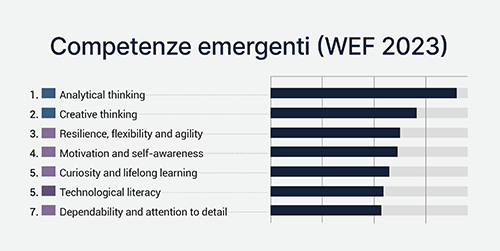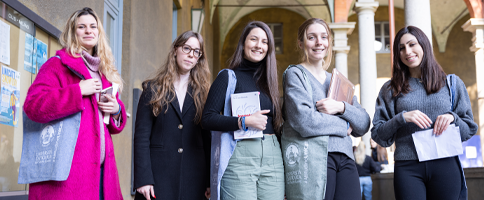Philosophy of the Digital Age and Artificial Intelligence is the new profile of the undergraduate degree programme in Philosophy. The recent development of generative artificial intelligence systems and the increasing diffusion of artificial agents with autonomous behavior are prompting us to rethink the meaning and conditions of interaction between humans and technology products: an issue that can be addressed by people capable of combining philosophical thinking and digital systems skills.
This undergraduate degree programme, unique in its cultural and teaching approach, is designed to respond to the growing demand from the different components of our society - companies, public administration, schools, healthcare, ... - for flexible professionals, capable of combining skills in the humanities with a solid understanding of smart systems technologies and the digital transition.
The theoretical approach of the courses offered is integrated with the activities promoted by the Faculty, such as seminars, meetings with internationally renowned philosophers and professors, as well as experimentation and research workshops aimed at developing an aptitude for active learning and learning by doing, in line with the forecasts of the World Economic Forum (World Economic Forum 2023) related to skills emerging as a result of the transformation of the world of work.

Why Artificial Intelligence in Philosophy
The knowledge and practice of philosophy help us live and work in a conscious way, especially in a changing cultural context such as the one in which we find ourselves and, plausibly, will find ourselves in the coming years. In a society increasingly systematically co-inhabited by humans and artificial entities with complex and autonomous behavior, critical and creative thinking and the ability to communicate correctly and effectively are fundamental. A degree programme in philosophy therefore aims first and foremost to help students develop the knowledge and skills that will enable them to think critically and creatively and to communicate correctly and effectively.
This programme offers an experience in which philosophical thought and its history, communication through digital media and the science and technology of machine learning interconnect, as determining elements of a future that we are building and that we want to be "human-friendly".
Key facts
- Degree class: L-5
- ECTS: 180
- Duration: 3 years
- Places available: open access
- Language: Italian
- Campus: Milan
- Classes start: October 2025
Why Choosing Philosophy of the Digital Age and Artificial Intelligence?

Key insights
- Curricular flexibility that allows the degree progamme to be adapted to students' interests and aspirations;
- The integration of lectures with seminars, meetings with internationally renowned philosophers and professors, as well as research and in-depth study activities;
- The opportunity to develop a philosophical and analytical approach in any context;
- The broad career prospects that come with versatile training.

Career Opportunities
In addition to the option of continuing their studies with a graduate degree and traditional job opportunities in teaching and research, graduates in Philosophy of the Digital Age and Artificial Intelligence will be able to, among other things, to:
- become Cultural Operators, coordinating educational, informative and dissemination activities for events, expositions and exhibitions with a high cultural and innovative impact;
- work in the Human Resources area in national and international companies, selecting training programmes, managing personnel and contributing to the optimization of interpersonal relationships;
- operate as experts in the management of artificial intelligence applications, in companies, bodies and institutes (both public and private), which create and provide services that make use of artificial intelligence technologies, or that create innovative products that include such technologies;
- work as Archive and Library Assistants, contributing to the preservation and digitization of documentary material.



